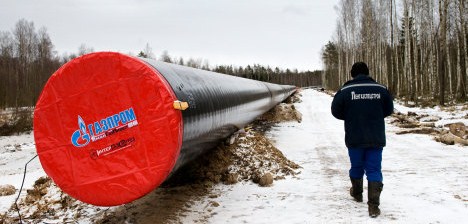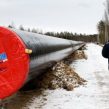
Scandinavian Governments Allow Russo-German Nord Stream Pipeline
Publication: Eurasia Daily Monitor Volume: 6 Issue: 207
By:

On November 5 the Finnish and Swedish governments gave Nord Stream, the Gazprom-led consortium, permission to lay the pipeline through their respective economic zones on the Baltic seabed, on an approved route from Russia to Germany. The Danish government had given its permission in late October. The Kremlin and Gazprom had been seeking that permission arduously for the last three years.
Those three Nordic governments had resisted or procrastinated on the basis of ecological and security considerations. The influential Scandinavian Greens objected strongly. Ultimately, however, each government’s bilateral political relations with Russia weighed heavily in their decisions. Of these three countries, only Denmark seeks to be connected with the Nord Stream pipeline and import Russian gas, in modest volume initially.
Countries on the Baltic Sea’s opposite rim –Estonia, Latvia, Lithuania, and Poland– had raised manifold objections to the project on ecological, economic, and strategic grounds. The four countries’ prime ministers have promptly criticized the Scandinavian governments’ decision on those grounds (PAP, November 6; BNS, November 6, 9).
Strategically, Nord Stream –should it materialize– would allow Russia to interrupt gas supplies to those countries through the existing pipelines, while maintaining full supplies via Nord Stream to Germany and potentially other West European countries. E.U. risk-sharing and solidarity could be subjected to considerable strain in such a situation, or under the threat of a supply crisis.
Politically, the Scandinavian collective approval of Nord Stream amounts to a significant success for Russia. It rewards Moscow’s efforts to divide the European Union, frustrate the formation of a common E.U. energy policy, and capitalize on Berlin’s neo-Ostpolitik to lock Germany into a dependency relationship with Russia.
In practical terms, however, Russian gas supply sources and financing for the Nord Stream pipeline look highly dubious. Moscow will probably try to use certain West European political friends and some energy champions to lobby for subsidies to the pipeline. But approval of E.U. financing looks dauntingly difficult and would still not ensure long-term gas supplies from Russia through Nord Stream.
The pipeline would run for 1,220 kilometers on the Baltic seabed, from Vyborg near St. Petersburg to Greifswald on the German coast. Nord Stream is planned to consist of two twin lines, each with an annual throughput capacity of 27.5 billion cubic meters (bcm). Under the construction schedule as currently proposed (following multiple amendments), work would start in spring 2010, to complete and commission the first line by late 2011. Construction of the second line is promised to start in 2012, for completion in 2014. The full throughput capacity should be reached by 2015 at 55 bcm annually, for a presumed 25-year period. Construction costs are estimated at 7.5 billion Euros by the consortium ($15 billion), by many European analysts (Handelsblatt, Financial Times Deutschland, November 6, 7)
Gazprom controls the consortium with 51 percent of the shares; Germany’s Ruhrgas and Wintershall (gas-trading subsidiaries of the E.On energy conglomerate and BASF chemicals giant, respectively) with 20 percent each; and the Dutch company Nederlands Gasunie with 9 percent. The consortium is Swiss-registered as are other Kremlin-sponsored, opaque energy ventures.
E.On and BASF have predicated their corporate strategies on long-term over-reliance on Russian gas. For Gasunie, by contrast, contracting for Russian gas is a move to diversify Dutch imports while North Sea gas reserves decline.
Consecutive German governments have also drifted into a policy of dependency on Russian gas, at almost 40 percent of annual national consumption (with a similar percentage for Russian-delivered crude oil) prior to the 2008-2009 economic recession. Such a dependency level is much higher than in any country in the “old” E.U. The Nord Stream project, should it materialize as intended, would increase Germany’s dependency even further.
Energy security considerations could have prompted Germany to cooperate with Brussels and the E.U.’s new member countries in the common interest of reducing dependency on Russian energy. Instead, however, German governments of both main parties and key interest groups are prepared to increase Germany’s dependence on Russian gas while ignoring and sometimes undercutting E.U. diversification goals and new member countries’ interests.
German policy reflects apprehensions that commercially viable Russian gas reserves and production will not suffice to cover European import demand in the years ahead. These worries are being expressed privately, but covered publicly by business and government with declarations of confidence in Russia. While anticipation of a Russian supply crunch is well-grounded, thus far the German response has been to rush for access to the available Russian reserves ahead of other European customers. Moscow itself is stimulating a competitive race among national energy champions in Europe –and also between European and U.S. companies– for access to Russian supplies.
The German government’s policy in this regard has remained consistent under both major parties thus far. Social-Democrat Chancellor Gerhard Schroeder became Nord Stream’s German godfather in 2005, for a purely bilateral Russo-German project. His successor, Christian-Democrat Chancellor Angela Merkel –temporarily with the Social-Democrats in a coalition government– has attempted to put a slight European veneer on this Russo-German project. The entry of Gasunie, and Merkel’s lobbying the E.U. to declare Nord Stream a project in Europe’s interest, cannot obscure the project’s bilateral Russo-German essence, to the detriment of a common E.U. energy policy.




